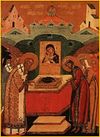

| Previous day | Next day |
| Old Style
July 2
|
Monday |
New Style
July 15
|
| 4th Week after Pentecost. Tone 2. | No fast.
|
![]() The Placing of the Honorable Robe of the Most Holy Theotokos at Blachernae (5th c.).
The Placing of the Honorable Robe of the Most Holy Theotokos at Blachernae (5th c.).
St. Juvenal, patriarch of Jerusalem (ca. 458). St. Photius, metropolitan of Kiev (1431).
Uncovering of the relics of New Hieromartyr Sergius Florinsky, priest of Rakvere, Estonia (2003).
Icon of the Mother of God of Theodotiev (1487). Icon of the Mother of God of Pozhai (XVII). Icons of the Most Holy Theotokos “Of Akhtyra” (1739) and “The Root of Jesse”.
Martyrs Paul, Bilonus, Theonas, and Heron, at Thessalonica (3rd-4th c.). St. Monegunde of Chartres (Gaul) (530). St. Swithun, bishop and wonderworker of Winchester (862). St. Basil, patriarch of Jerusalem (836 or 838). Right-believing King Stephen the Great, of Moldavia (1504). Hieromartyr Juvenaly of Alaska, protomartyr of America (1796). New Martyr Lampros of Makri in Thrace (1835).
Repose of Archimandrite Lawrence of the Iveron-Valdai Monastery (1876) and Elder Zachariah, schema-archimandrite of St. Sergius Lavra (1936).
Thoughts for Each Day of the Year
According to the Daily Church Readings from the Word of God
By St. Theophan the Recluse

Monday. [Rom. 9:18-33; Matt. 11:2-15]
The Kingdom of Heaven suffereth violence, and the violent take it by force. The kingdom suffereth violence—that is, it is attained with violence, with labour, force, and difficult spiritual struggles; therefore only those who lead a labor-filled ascetic life attain it. This is how comfort of every sort is renounced along the path to the kingdom. Pleasures of all types distance us from the kingdom; but these days we have concern only for pleasures, sometimes emotional, but more often fleshly: to eat, drink, have fun, make merry and luxuriate in everything. We have said to the kingdom, “I beg you to excuse me,” though there is a feast in the kingdom—a royal feast, one so sumptuous that we could not even conceive of it, because we do not have the taste for it. What there is considered sweet, to us is bitter; what there is pleasant, for us is repulsive, what there gladdens, for us is a burden—we have gone totally separate ways. And the kingdom, together with the violent who take it by force, withdraws from us. We are glad, even ready to drive them away more quickly, indeed we already have started talking about it; but the evil one does not manage to arrange this.
Articles
 St Photius the Metropolitan of KievSaint Photius, Metropolitan of Kiev and All Russia, was by birth a Greek from the Peloponnesian city of Monembasia (Malbasia). |
 Icon of the Mother of God of TheodotievThis Icon appeared in 1483 in the vicinity of Ryazan in a desert place called "Staroe," near the village of Theodotiev. |
 Icon of the Mother of God of AkhtyrThe Akhtyr Icon of the Most Holy Theotokos appeared on July 2, 1739 in the village of Akhtyr in the area of Kharkov, east of Kiev. |








